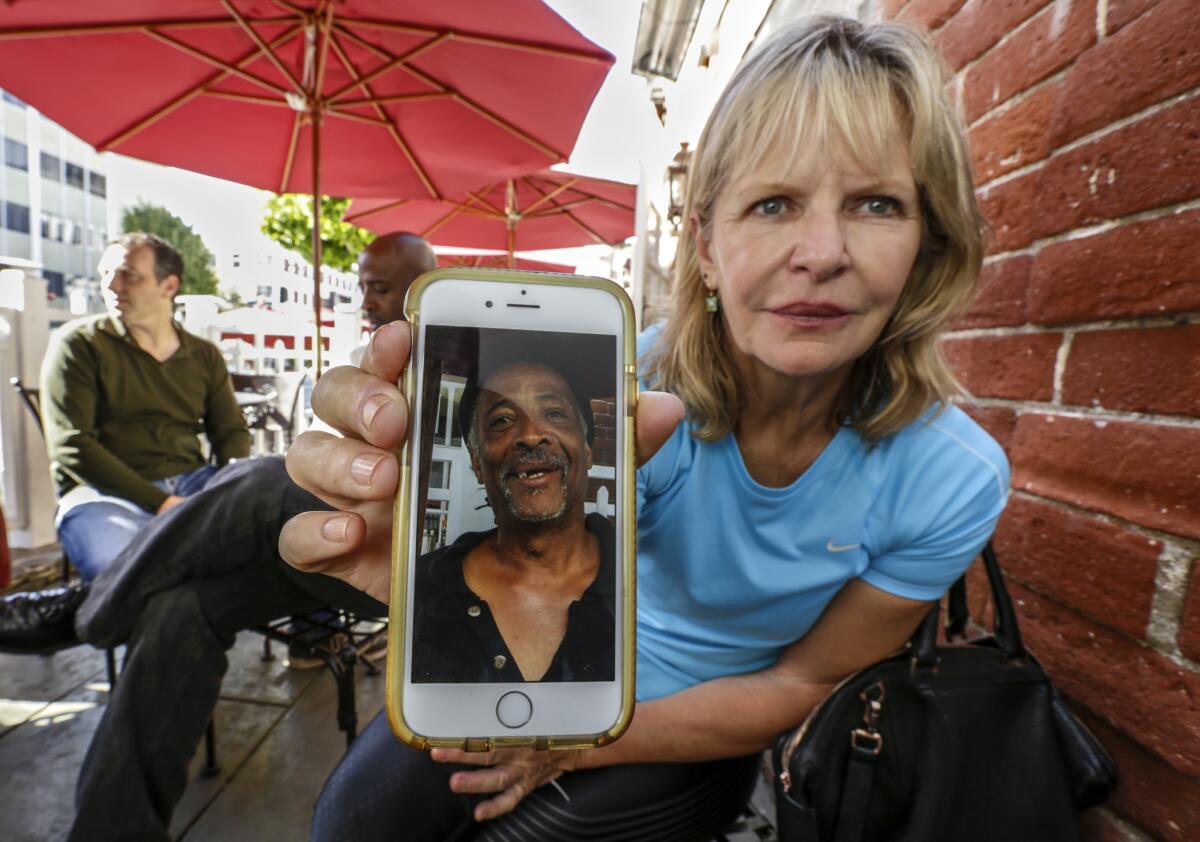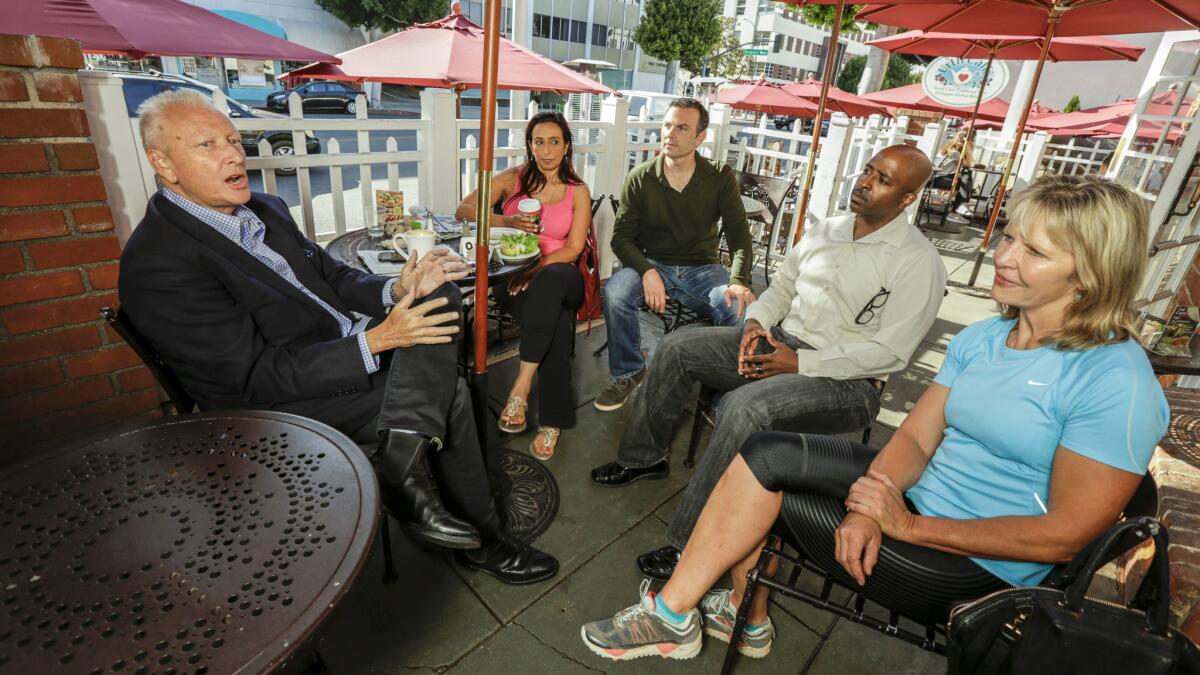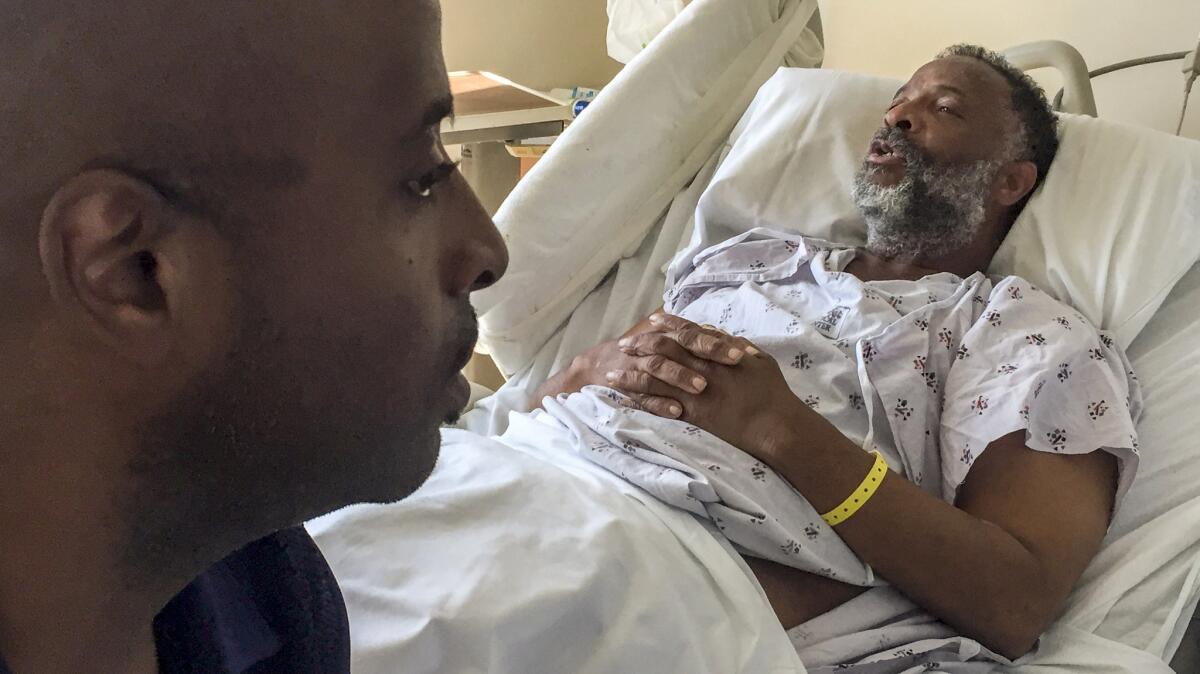Beverly Hills accused of driving out homeless man befriended by Larry King, others

George Saville slept on a cot in a downtown homeless shelter. In the morning, he would catch the bus to Beverly Hills.
There, Saville’s wit and wide knowledge of news, entertainment and sports drew a circle of admirers, including a half-dozen people who took their morning coffee at Urth Caffe.
The cafe owners supported him. Sports stars such as Lamar Odom and Jason Kidd stopped by for daily tidbits of information. Arab royals from the Beverly Wilshire Hotel asked him to pose in their selfies, Saville’s supporters said.
“He’s smart; he has historical references,” said Maria Belknap, a business manager and Urth patron. “He knows the L.A. Times and New York Times inside and out and he can talk about everything.”
“At best he is charming, at worst he is harmless,” said television host Larry King, who eats breakfast nearby and has slipped him cash on occasion. “Every community has a panhandler, and Beverly Hills is not so far above it.”
City officials, however, call Saville an opportunist and “aggressive panhandler” and considered drawing up a “shame list” to pressure cafe owners to stop catering to him.
After a run-in with a city-funded private patrol, known to locals as “greenshirts,” Saville was charged with two misdemeanors and ordered to stay away from the restaurant. Saville’s friends call the charges bogus and merely a ploy to drive the 57-year-old homeless man out of town.
“What you’ve mounted is an extrajudicial squad of greenshirts [who] are there to clear the streets of undesirables,” David Lyle, president of a television and digital content producers association, told the Beverly Hills human rights commission in May.
At a separate hearing, James Latta, the city’s human services administrator, countered that, “if it’s someone that wanted our help and needed help, we’ve got it for him. But this individual doesn’t want it.”
Saville’s clash with officials raises questions about how far cities can go to clear public spaces of indigents — and what obligation, if any, homeless people have to accept services and shelter.
Saville recently received head injuries from a fall on skid row and remains hospitalized. His friends in Beverly Hills are trying to get his case dropped, and find him housing.
“They treat me like I’m one of them, which I really am one of them, just not the money-wise,” Saville said.

::
Beverly Hills has a generous homeless services budget — more than $800,000 for at most several dozen unsheltered people. But officials can’t give homeless people housing because they don’t have any. The city controls a single unit in a homeless housing project in Los Angeles, and has funded others — all outside Beverly Hills.
Goaded by the city’s “golden triangle” of ultra-luxe businesses, the city a year ago launched the $500,000 Ambassador Program. The 21 “ambassadors” — dressed in green polo shirts, black pants and hats — guide tourists and patrol garages and “aggressive panhandling” in business districts. The program is run by Block by Block, a private company that provides cleanup crews and patrols for 72 districts nation-wide, including Santa Monica, West Hollywood and old Pasadena.
Latta said ambassadors find shelter for homeless people, and business owners said they’ve seen them show compassion. The group has also helped send panhandlers out of town.
“I can’t tell you what a joy it was to hear that West Hollywood — well, not a joy — that West Hollywood’s homeless went from 42 to 88 people and our homeless count went from 29 to 14 because of the ambassador team,” Latta said at the human relations commission’s April meeting.
Saville grew up in Rialto, coached Little League and said he worked for years in aerospace manufacturing. He was in prison several times for drug sales and possession between 1991 and 2012, records show; his friends say that doesn’t bother them.
“George’s life has been disrupted for so long he’s gotten used to it,” Lyle said.
Saville said homelessness persists because it takes so long to get into housing, adding, “You’d be surprised how long the waiting list is to be poor.”

Saville said he began hanging out in Beverly Hills five years ago. In October, the security crews started “standing eyeball to eyeball around him, two or three at a time,” Lyle said.
“They began talking smack to George: ‘What are you doing here?’” said Belknap, who said she grew so concerned that complained to the Beverly Hills police. “I personally found it very menacing.”
In March, Saville was charged with misdemeanor battery and a hate crime stemming from a February confrontation with the ambassadors. The prosecutor did not respond to requests for comment. Beverly Hills Police Lt. Lincoln Hoshino said the hate crime allegation related to sexual orientation, but declined to comment further while the case is pending.
Latta, the human services administrator, described Saville in unflattering terms at the meeting.
“For that particular individual if you give him money he is your best friend. If you don’t, he’ll be very nasty,” Latta told the Beverly Hills human relations commissioners. Latta said later that he was referring to aggressive panhandlers in general.
Latta said that although Saville didn’t bother Urth owners, he was hurting other businesses.
Scott Crandall, regional vice president of Block by Block, suggested at the commission meeting that area merchants should pressure Urth proprietors to help move Saville out.
Latta said he had rid his local grocery store of panhandlers by threatening to take his business elsewhere.
“I’ve done that six times and now there are no panhandlers there. Maybe that’s something that we could do with some of the businesses that are not working properly,” Latta said.
Commissioner Jerald Friedman suggested calling public attention to merchants who refuse to support the city’s efforts to discourage panhandlers.
“I don’t want to call it a shame list, but a list of owners who are not complying with the wishes or desires of the city to improve the environment of the streets,” Friedman said. “If I saw that I might not go to that store.”
Urth’s owners, Shallom and Jilla Berkman, declined to comment.
Last month, Lyle and Saville’s sister, who traveled from Tucson to oversee his care, appealed to the Beverly Hills City Council to have the criminal case dropped. Mayor John A. Mirisch asked the city manager to report back on the request and Lyle’s allegations of harassment by security officers.
Vice Mayor Nancy H. Krasne asked whether the sister, Sylvia Saville Flaherty, would take responsibility for her brother. “Would you take him to Arizona with you?” Krasne repeated several times.
“I can’t be responsible for him. He’s a grown man,” a startled Flaherty said. “Are you telling me that I have to take him away?”
Saville is continuing to recuperate from his injuries. In an interview from his hospital bed, he said he was wrongly accused, but harbors no ill feeling toward the city.
“Being around skid row for so many years, going up there seeing people in the mainstream of society that are really existing … it’s uplifting,” Saville said. “Beverly Hills is beautiful, man.”
Times staff photographer Irfan Khan contributed to this report.
Twitter: @geholland
ALSO
L.A.’s Grand Park is a celebration of contemporary America
Marijuana exhibit at Oakland museum presents the high and lows of pot
Bosnian Muslims in Southern California may not fit the stereotype but they feel the prejudice
More to Read
Sign up for Essential California
The most important California stories and recommendations in your inbox every morning.
You may occasionally receive promotional content from the Los Angeles Times.










